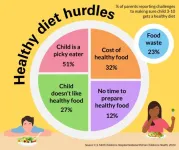(Press-News.org) While most parents of preschool and elementary aged children strive to give their children a balanced, nutritional diet, some of their strategies to promote healthy eating may backfire, a national poll suggests.
A top example from the report: Three in five parents customize meals if their child doesn’t like what everyone else is eating.
Meanwhile, one in eight parents require children to eat everything on their plate, according to the University of Michigan Health C.S. Mott Children’s Hospital National Poll on Children’s Health. And while just one in three believe the standard American diet is healthy for kids, few have tried alternative, potentially more nutritional menus at home.
“Feeding young children can be difficult due to general pickiness, hesitancy to try unfamiliar foods and constantly evolving food preferences,” said Mott Poll co-director and Mott pediatrician Susan Woolford, M.D.
“The preschool and elementary age is an important time to establish healthy eating patterns. Yet parents’ concern about whether their child is eating enough or if they’re getting the nutrients they need may lead them to adopt practices that actually sabotage their efforts to get kids to have healthy eating habits in the short and long term.”
The nationally representative report is based on 1,083 responses of parents of children ages 3-10 surveyed in February.
More on poll findings:
Parents’ beliefs on nutritional diets vary
Just a third of parents think the standard American diet is healthy compared to half who seem to rank the Mediterranean higher in nutritional value. Still, few have tried alternative diets for their child.
“Parents may recognize the standard diet in the U.S. includes high amounts of saturated fats, added sugars, sodium, and refined carbohydrates, which can generate an excess intake of calories beyond nutritional needs and contribute to health problems,” Woolford said.
“However, despite this recognition and evidence suggesting that other diet options may help avoid many illnesses, only about 9% have tried the Mediterranean diet for their children and fewer have tried giving their children a vegetarian diet.”
Parents should ensure children are still getting adequate nutrition if they do try diets that eliminate certain food categories, she adds. Diets that limit animal products, for example, will require alternative protein sources such as meat substitutes, tofu, or legumes for children.
And while ketogenic diets have become popular among adults, they are generally not appropriate for children.
Family dining rules may promote or hinder a child’s healthy diet.
Fifteen percent of parents say their family rule is that kids finish what’s on their plate, while more than half say children must try some of everything and a little less than a third say no to dessert if meals go unfinished.
But parents who try to force kids to eat may encourage portions that go beyond feeling full, Woolford cautions.
“Requiring children to eat everything on their plate, or withholding dessert unless all other foods are eaten, can lead to overconsumption, especially if portion sizes are too large for the child’s age,” she said.
She agrees with the recommendation that “parents provide, and the child decides.” This makes parents responsible for providing healthy options while allowing children to select which foods they will eat and the amount they want to consume.
Parents often play personal chef
Sixty percent of parents will make something separate if their child doesn’t like the food that’s on the dinner table – and this often leads to a less healthy alternative, Woolford says.
“Rather than allowing the child to choose an alternate menu, parents should provide a balanced meal with at least one option that their child is typically willing to eat,” she said.
“Then if their child chooses not to eat, parents should not worry as this will not cause healthy children any harm and they will be more likely to eat the options presented at the next meal.”
She points out that children learn through watching and imitating, so it’s beneficial for parents to model healthy eating through a well-balanced diet while their child’s eating habits and taste preferences mature.
Avoiding snacks between meals may also help children have a better appetite and increase willingness to eat offered foods.
Picky eating and protesting veggies among biggest battles
Parents describe their biggest challenges with making sure their child gets a healthy diet as the child being a picky eater, the higher cost of healthy food and food waste. Fewer say they don’t have time to prepare healthy food.
Nearly all parents polled report trying at least one strategy to get their child to eat vegetables as part of a healthy diet, such as serving vegetables every day, fixing vegetables how their child prefers, trying vegetables their child hasn’t had before and letting children pick out vegetables at the grocery store.
Others involve children with preparing the vegetables, hide vegetables in other foods or offer a reward for finishing vegetables.
“Unsurprisingly, parents said pickiness and getting kids to eat veggies were among major challenges during mealtimes,” Woolford said.
“Parents should try to include children in meal decisions, avoid pressuring food consumption and provide a variety of healthy options at each meal so kids feel more control.”
Right sizing food may be difficult
Portion size is key to mitigating the risk of childhood obesity, but it can be hard for parents to “right-size” a child portion.
In determining portion size for their child, nearly 70% of parents polled give their child slightly less than adults in the family while fewer let their child choose how much to take, use predetermined portions from the package or give their child the same portions as adults.
Woolford recommends parents seek sources to help. The U.S. Department of Agriculture, for example, provides a visual called “MyPlate” that can help parents estimate the recommended balance of the major food groups and offers guidance on estimating portion size.
Healthy eating starts at the grocery store
When grocery shopping or planning meals, parents polled say they try to limit the amount of certain foods to help their child to maintain a healthy diet, with more than half limiting foods with added sugars and processed foods.
But it may be difficult to identify unhealthy food. Added sugars or processing may be present in foods marketed or packaged as healthy, Woolford says.
Parents should read labels, avoiding the marketing on the front of packages and focusing instead on the details on the back. They should pay particular attention to nutrition information and ingredient lists – especially if they’re long with unrecognizable items – as well as sodium, added sugars, and fat.
Woolford also encourages involving children in grocery trips, spending time in the produce section and asking them what they may like to try.
“Have them help in the process of choosing the healthiest options, not ones that necessarily directly advertise to children, but foods that they are willing to try that are lower in sugar, fat and salt,” she said.
“Spend most of the time in the produce section and try to make it fun by maybe selecting new options from different parts of the world that they haven't tried before.”
END
3 in 5 parents play short order cook for young children who don’t like family meal
Kids’ diets: Just 1 in 3 parents think the standard American diet is healthy but few try alternatives; 1 in 8 pressure kids to eat everything on their plate
2024-04-22
ELSE PRESS RELEASES FROM THIS DATE:
Japan’s premodern concept of nature at root of distinctive mindset in early childhood education
2024-04-22
Osaka, Japan — Observers of Japanese early childhood education and care have pointed to the mindset of educators watching over and waiting on preschoolers as being an intriguing tendency. This mimamoru approach has its roots in a premodern concept of nature, according to Professor Yosuke Hirota at the Graduate School of Literature and Human Sciences of Osaka Metropolitan University.
Professor Hirota looked into the works of Sozo Kurahashi (1882-1955) and Kitaro Nishida (1870-1945) to see how this concept of nature from the past made its way into education in the present day. Kurahashi’s writing on ...
First Nations patients leave ED without completing treatment more than comparable non–First Nations patients
2024-04-22
First Nations patients in Alberta leave emergency departments (EDs) without completing treatment more often than comparable non–First Nations patients, due in part to anti-Indigenous racism expressed by providers, found new research published in CMAJ (Canadian Medical Association Journal) https://www.cmaj.ca/lookup/doi/10.1503/cmaj.231019.
Higher proportions of incomplete ED care for First Nations patients compared with non–First Nations patients occurred even in cases of serious diagnosis, and were found across all parts of Alberta. Provincially, 6.8% of First Nations visits end without completing ...
What do you know about measles and vaccination?
2024-04-22
With measles cases rising in Canada and internationally, it is important for clinicians to understand the disease and the role of vaccination against measles. Two practice articles in CMAJ (Canadian Medical Association Journal) https://www.cmaj.ca/lookup/doi/10.1503/cmaj.240415 https://www.cmaj.ca/lookup/doi/10.1503/cmaj.240371
provide succinct overviews of this highly infectious disease. Many clinicians may not have direct experience with measles diagnosis and treatment as Canada achieved measles elimination status in 1998.
“The increase in measles activity globally and in Canada is a reminder of the importance of immunization. ...
Giant galactic explosion exposes galaxy pollution in action
2024-04-22
A team of international researchers studied galaxy NGC 4383, in the nearby Virgo cluster, revealing a gas outflow so large that it would take 20,000 years for light to travel from one side to the other.
The discovery was published today in the journal Monthly Notices of the Royal Astronomical Society.
Lead author Dr Adam Watts, from The University of Western Australia node at the International Centre for Radio Astronomy Research (ICRAR), said the outflow was the result of powerful stellar explosions in the central regions of the galaxy that could eject enormous amounts of hydrogen and heavier elements.
The ...
Understanding ‘how’ pupils learn is key to tackling wandering focus in a digital age
2024-04-22
School attendance figures are dwindling, there are more pupils than ever before needing additional support, and a demanding legion of exams – all of which mean pupils are struggling to learn, an education expert has warned.
But, he suggests, with a renewed focus on the techniques of learning, pupils can be guided to success.
In a difficult environment for teachers, it is clear they need support. Failure might be inevitable in a classroom, former teacher Alex Quigley argues, but if teachers can understand why learning has failed, they can address ...
Everest mountaineer’s letters digitized for the first time
2024-04-22
Letters written by the famous mountaineer George Mallory have been made available to a global audience for the first time, in the centenary year of his fatal attempt to scale Everest.
An alumnus of Magdalene College, Cambridge, Mallory is known for purportedly replying "because it's there" when asked by a reporter why he wanted to climb Everest. There is still debate about whether he and his climbing partner Andrew ‘Sandy’ Irvine did in fact make it to the top ...
Scientists worldwide in line for US$1.1 million Frontiers Planet Prize as 2024 National Champions announced
2024-04-22
The Frontiers Planet Prize today (22 April) announced 23 National Champions drawn from science research teams across six continents in the second year of the global competition. The Prize recognizes scientists whose research contributes to accelerating solutions that ensure humanity remains safely within the boundaries of the Earth's ecosystem. The National Champions now move forward to the final round of the competition, where three International Champions will be awarded 1 million CHF each to support their research. ...
Study shows more than half of global infectious diseases experts surveyed rate influenza as the number one pathogen of concern of pandemic potential
2024-04-21
**Note: this is an early release from the ESCMID Global Congress (formerly ECCMID, Barcelona, Spain, 27-30 April). Please credit the congress if you use this story**
New research presented at the ESCMID Global Congress (formerly ECCMID) in Barcelona, Spain (27-30 April) shows that in a VACCELERATE Consortium survey study in which infectious diseases experts were asked to rank pathogens in order of their pandemic potential, influenza was considered the pathogen of highest pandemic risk, with 57% ranking influenza as number one, and a further 17% ranking it second (See full table, notes to editors).
The study is by Dr Jon Salmanton-García, University ...
Empty-handed neurons might cause neurodegenerative diseases
2024-04-20
Tokyo, Japan – Researchers from Tokyo Metropolitan University have identified how proteins collect abnormally in neurons, a feature of neurodegenerative diseases like Alzheimer’s. They used fruit flies to show that depletion of mitochondria in axons can directly lead to protein accumulation. At the same time, significantly high amounts of a protein called eIF2β were found. Restoring the levels to normal led to a recovery in protein recycling. Such findings promise new treatments for neurodegenerative diseases.
Every cell in our bodies is a busy factory, where proteins ...
Black women hospitalised in USA with blood infection resistant to last-resort antibiotic at increased risk of death
2024-04-20
Nationwide analysis of a large, geographically diverse cohort of adults in the USA suggests increased risk for hospital-acquired carbapenem-resistant enterobacterales bloodstream infections among racial and ethnic minorities may be due in part to hospitalisations for underlying comorbidities and associated with racial and biological sex inequities
**ECCMID has now changed name to ESCMID Global, please credit ESCMID Global Congress (Barcelona, Spain, 27-30 April) in all future stories**
New research being presented at this year’s ESCIMD Global Congress (formerly ...
LAST 30 PRESS RELEASES:
Sleep loss linked to higher atrial fibrillation risk in working-age adults
Visible light-driven deracemization of α-aryl ketones synergistically catalyzed by thiophenols and chiral phosphoric acid
Most AI bots lack basic safety disclosures, study finds
How competitive gaming on discord fosters social connections
CU Anschutz School of Medicine receives best ranking in NIH funding in 20 years
Mayo Clinic opens patient information office in Cayman Islands
Phonon lasers unlock ultrabroadband acoustic frequency combs
Babies with an increased likelihood of autism may struggle to settle into deep, restorative sleep, according to a new study from the University of East Anglia.
National Reactor Innovation Center opens Molten Salt Thermophysical Examination Capability at INL
International Progressive MS Alliance awards €6.9 million to three studies researching therapies to address common symptoms of progressive MS
Can your soil’s color predict its health?
Biochar nanomaterials could transform medicine, energy, and climate solutions
Turning waste into power: scientists convert discarded phone batteries and industrial lignin into high-performance sodium battery materials
PhD student maps mysterious upper atmosphere of Uranus for the first time
Idaho National Laboratory to accelerate nuclear energy deployment with NVIDIA AI through the Genesis Mission
Blood test could help guide treatment decisions in germ cell tumors
New ‘scimitar-crested’ Spinosaurus species discovered in the central Sahara
“Cyborg” pancreatic organoids can monitor the maturation of islet cells
Technique to extract concepts from AI models can help steer and monitor model outputs
Study clarifies the cancer genome in domestic cats
Crested Spinosaurus fossil was aquatic, but lived 1,000 kilometers from the Tethys Sea
MULTI-evolve: Rapid evolution of complex multi-mutant proteins
A new method to steer AI output uncovers vulnerabilities and potential improvements
Why some objects in space look like snowmen
Flickering glacial climate may have shaped early human evolution
First AHA/ACC acute pulmonary embolism guideline: prompt diagnosis and treatment are key
Could “cyborg” transplants replace pancreatic tissue damaged by diabetes?
Hearing a molecule’s solo performance
Justice after trauma? Race, red tape keep sexual assault victims from compensation
Columbia researchers awarded ARPA-H funding to speed diagnosis of lymphatic disorders
[Press-News.org] 3 in 5 parents play short order cook for young children who don’t like family mealKids’ diets: Just 1 in 3 parents think the standard American diet is healthy but few try alternatives; 1 in 8 pressure kids to eat everything on their plate







